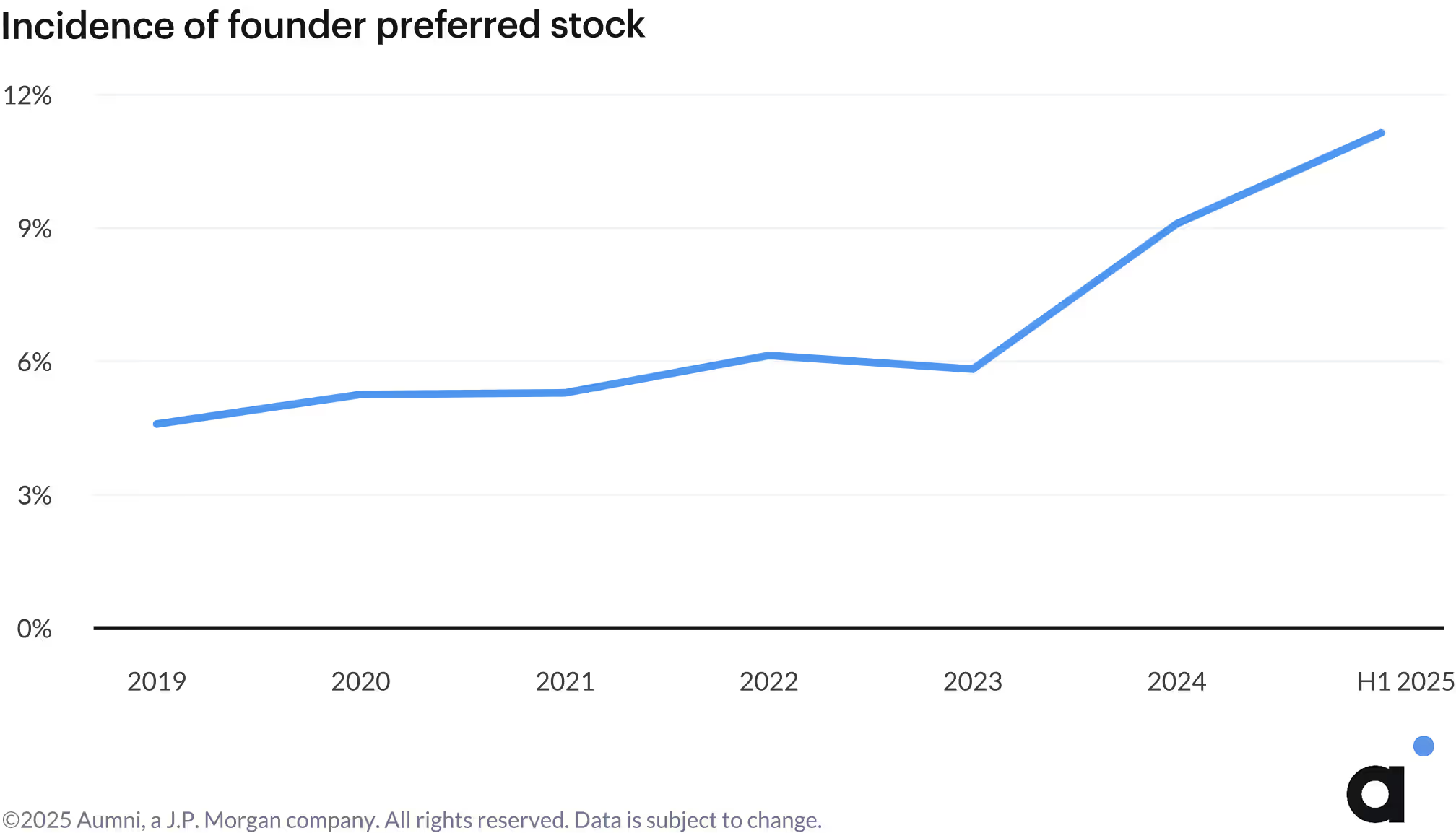The rise of founder preferred shares: Key insights from Aumni and Fenwick

The recent webinar, “What’s changing in VC according to 80,000+ data points,” hosted by Aumni and Fenwick & West, brought together legal and venture experts to discuss the evolving landscape of founder preferred shares. As data shows a resurgence in the use of this equity class, the panelists explored its legal, strategic, and cultural implications for founders and investors alike.
What are founder preferred shares?
Founder preferred shares are a distinct class of stock, typically created at company formation, specifically designed for company founders. The structure aims to optimize tax treatment for founders, potentially qualifying sales for long-term capital gains rather than ordinary income. Unlike common stock, founder preferred typically carries enhanced rights and protections, such as:
- Liquidation preferences: Founders may receive priority payouts in the event of a sale or liquidation, ensuring they are not subordinated to later-stage investors.
- Voting rights: This class can include super-voting provisions, allowing founders to retain control over major corporate decisions.
- Protective provisions: Founders may have veto rights over certain actions, such as future financings or changes to company bylaws.
- Conversion rights: Founder preferred can often be converted to common stock under specific conditions, providing flexibility as the company matures.
These features are designed to safeguard founders’ interests, especially as the investor base evolves through multiple funding rounds.
The Q2 2025 Venture Beacon Report noted increased adoption of founder preferred share classes, continuing a trend that began in 2024. Founder preferred stock was present in nearly 11% of companies at the time of their priced equity financing events in the first half of 2025, reflecting an increase from approximately 9% in 2024 and 6% in 2023.

Why are founder preferred shares gaining traction?
Panelists noted that the prevalence of founder preferred shares could be increasing for a variety of reasons:
- Extended exit timelines: Traditional exit timelines are lengthening, with companies staying private longer. This shift has increased the need for founders to access liquidity before a full exit.
- Sophisticated founders: Repeat founders, in particular, are more attuned to tax optimization and liquidity planning, often requesting founder preferred shares at company formation.
- Personal financial needs: Founders seek early liquidity for practical reasons—student loans, home down payments, tuition, and recouping years of sweat equity.
Legal and strategic implications
- Tax optimization: Founder preferred shares are structured to help founders achieve favorable tax treatment on secondary sales, but the panel emphasized that this is not “bulletproof.” Legal and tax advisors must be closely involved to ensure compliance and optimal outcomes.
- Board and governance dynamics: The conversion terms and control over founder preferred shares can impact board dynamics, especially if the board is founder-controlled. Investors will scrutinize the amount of founder preferred outstanding and the mechanics of conversion.
- Investor sentiment: The panelists highlighted mixed reactions from investors. Some view founder preferred as a negative signal—questioning why founders are seeking liquidity early—while others accept it as a practical tool for founder retention and alignment. In any case, successful implementation of founder preferred shares requires close coordination among founders, investors, legal, and tax advisors. Transparency and alignment are critical to avoid misunderstandings and ensure all parties are moving in the same direction.
Founder preferred shares are re-emerging as a strategic tool for founder liquidity and cap table management in today’s venture environment. While they offer potential tax and retention benefits, their implementation requires careful legal structuring, investor negotiation, and cultural sensitivity. As the market continues to evolve, ongoing data and dialogue—like that provided in this webinar—will be essential for founders and investors navigating these complex dynamics.
Ready to apply these insights to your own investment strategy? Learn more about Aumni Market Insights.
©2025 JPMorgan Chase & Co. All rights reserved. JPMorgan Chase Bank, N.A. Member FDIC.
This material is not the product of J.P. Morgan’s Research Department. It is not a research report and is not intended as such. This material is provided for informational purposes only and is subject to change without notice. It is not intended as research, a recommendation, advice, offer or solicitation to buy or sell any financial product or service, or to be used in any way for evaluating the merits of participating in any transaction. Please consult your own advisors regarding legal, tax, accounting or any other aspects including suitability implications, for your particular circumstances or transactions. J.P. Morgan and its third-party suppliers disclaim any responsibility or liability whatsoever for the quality, fitness for a particular purpose, non-infringement, accuracy, currency or completeness of the information herein, and for any reliance on, or use of this material in any way. Any information or analysis in this material purporting to convey, summarize, or otherwise rely on data may be based on a sample or normalized set thereof. This material is provided on a confidential basis and may not be reproduced, redistributed or transmitted, in whole or in part, without the prior written consent of J.P. Morgan. Any unauthorized use is strictly prohibited. Any product names, company names and logos mentioned or included herein are trademarks or registered trademarks of their respective owners.
Aumni, Inc. (“Aumni”) is a wholly-owned subsidiary of JPMorgan Chase & Co. Access to the Aumni platform is subject to execution of an applicable platform agreement and order form and access will be granted by J.P. Morgan in its sole discretion. J.P. Morgan is the global brand name for JPMorgan Chase & Co. and its subsidiaries and affiliates worldwide. Aumni does not provide any accounting, regulatory, tax, insurance, investment, or legal advice. The recipient of any information provided by Aumni must make an independent assessment of any legal, credit, tax, insurance, regulatory and accounting issues with its own professional advisors in the context of its particular circumstances. Aumni is neither a broker-dealer nor a member of any exchanges or self-regulatory organizations.
383 Madison Ave, New York, NY 10017





